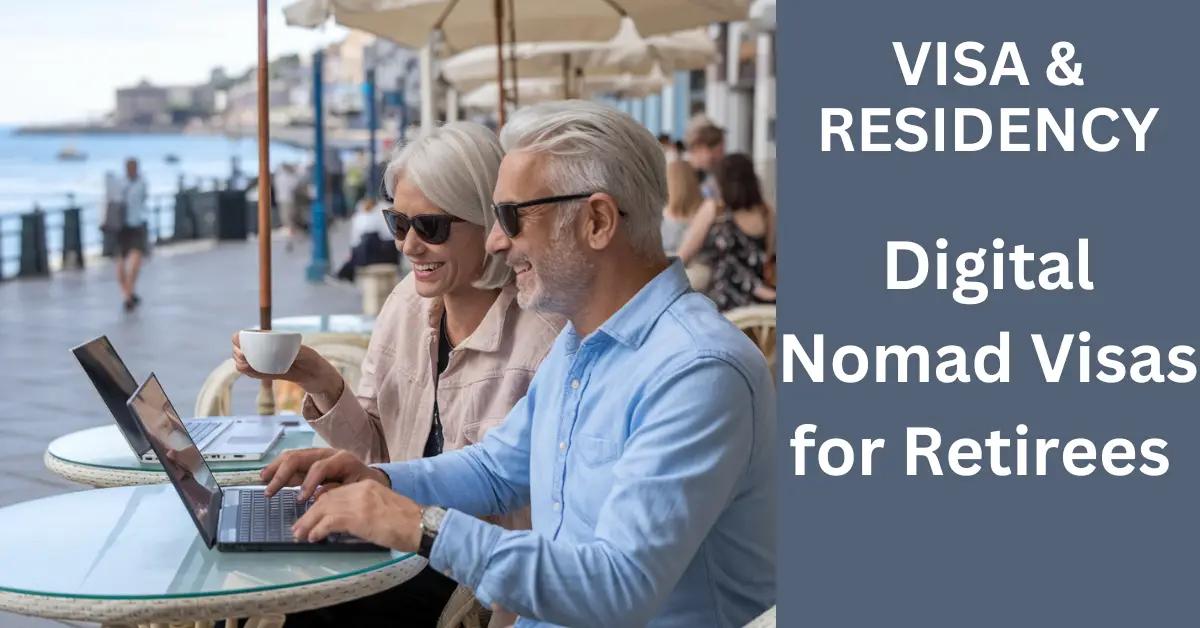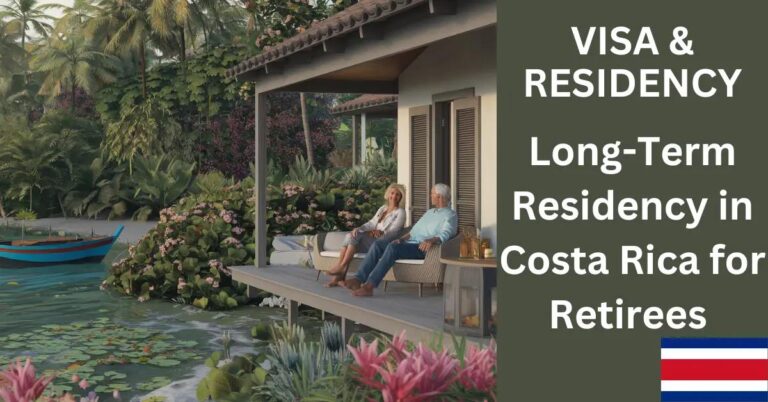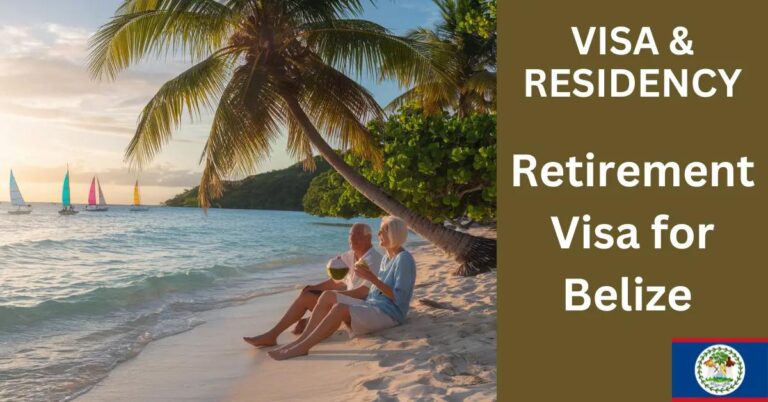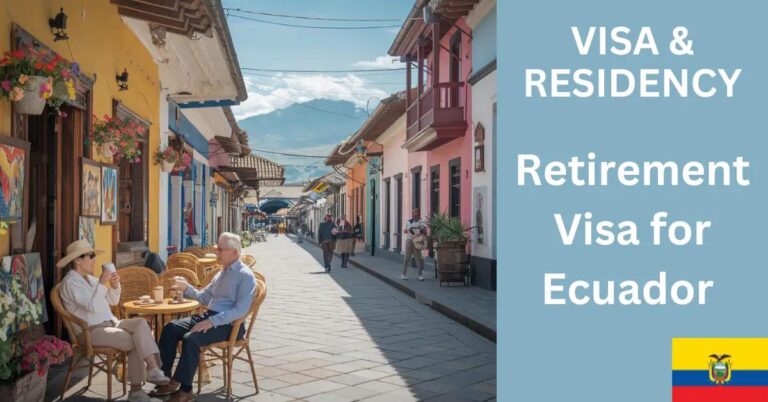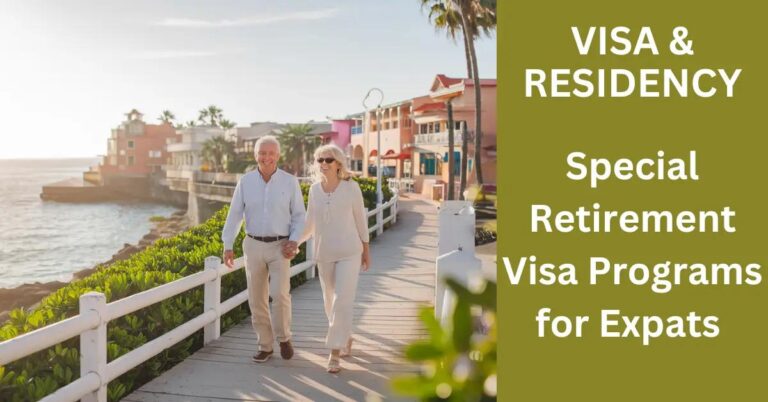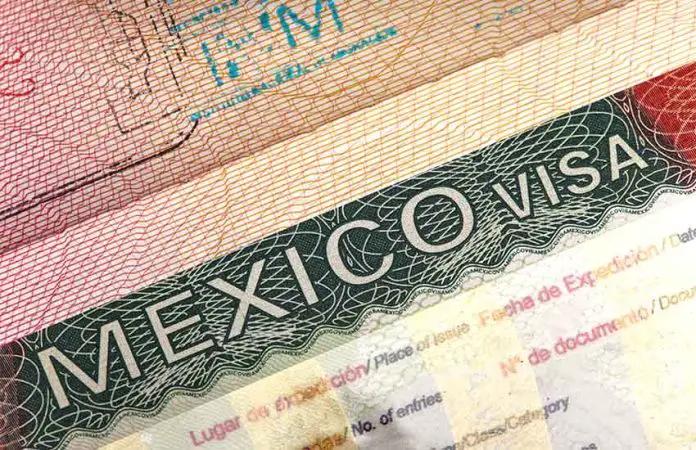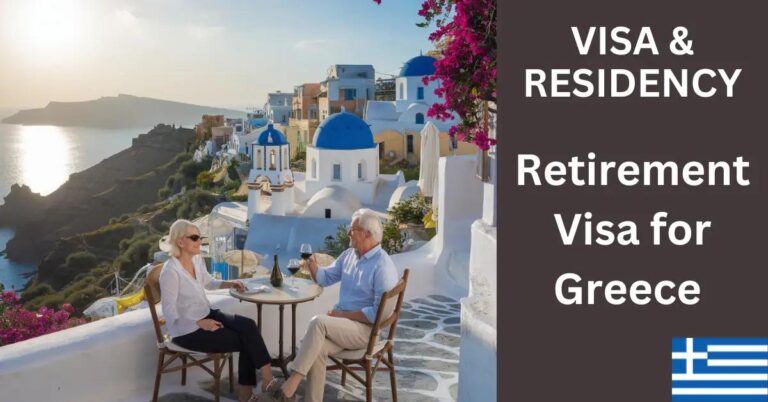TL;DR:
- Digital nomad visas allow retirees to live abroad; they require proof of steady income, like a pension, and possibly health insurance or a clean police record.
- Countries like Costa Rica, Portugal, and Spain offer retiree-friendly digital nomad programs with lower living costs.
- Portugal and Mexico offer straightforward retiree and digital nomad visa processes.
- Budgeting is crucial, considering living costs, healthcare, and potential tax implications.
- Health care options vary by country; many retirees opt for international health insurance.
- Language barriers can be overcome with learning and engagement, aiding cultural integration.
- Planning for relocation involves understanding visa processes, financial setups, and legal considerations.
- Retirement abroad offers cultural immersion and lower costs, but it requires careful preparation and adaptation.
Thinking about retirement abroad? Digital nomad visas could be your ticket. These visas let retirees live the nomadic lifestyle with ease and flexibility. But are they worth it? I'll guide you through what you need to know, from benefits of retiree-friendly countries to the easiest ways to qualify. Let's explore if this path fits your retirement dreams or if there's a catch. Are you ready for a new adventure?
What Are Digital Nomad Visas for Retirees?
Digital nomad visas let people live and work in new places. They started for people who want to work remotely while traveling. But now you can find digital nomad retirement programs designed just for retirees. These programs allow more freedom and adventure in your golden years.
Do retirees qualify for digital nomad visas? Yes, some do! You need proof of steady income, like a pension. Each country might have its own rules, which can seem tricky. You may need to show income above a set amount. Some places may ask for health insurance or a clean police record.
Why do digital nomad visas work well for retirees? They offer more than just a good time. You may find it less expensive to live in another country. Plus, you can enjoy new places and cultures. Imagine spending every day near a sunny beach or exploring historic cities.
Countries like Costa Rica, Portugal, and Spain have great digital nomad programs. They are retiree-friendly and offer many benefits. Costa Rica's Pura Vida lifestyle can bring joy. Portugal's rich culture can offer fun and adventure. Spain has a warm climate perfect for those sunny morning strolls.
What are the benefits of these visas for retirees? Lower living costs can make your money go further. Better weather could boost your health. New foods and traditions can enrich your life. Plus, you get a chance to meet new people and make new friends.
Choosing this path offers more than travel; it gives a fresh start. It might feel exciting, new, and even a little scary, but could also be a big and rewarding journey.
Which Countries Provide the Best Retirement Visa Options?
When considering where to retire abroad, finding the best countries for retiree visas is key. Many countries offer retirement visas, but some stand out with excellent programs. These countries often provide appealing lifestyle benefits that cater to retirees. Let's explore some of the popular retiree-friendly countries and what they have to offer.
The best retirement visa countries often meet several important criteria. First, they provide an easy visa process, avoiding complex requirements. Countries with appealing climates and rich cultures, like Spain, Portugal, or Thailand, are favorites for many retirees. Affordability also plays a big role in choosing a retiree destination. Countries like Mexico and Malaysia offer a lower cost of living, making them attractive for retirees wanting to stretch their retirement savings.
Cost-effective retirement overseas is a big draw for many retirees. Countries like Ecuador and Costa Rica offer low living costs while maintaining a high quality of life. It is important to compare these costs and see which country gives you the best value for your money. Reviewing monthly expenses for housing, utilities, and groceries is essential.
There are cultural and lifestyle** benefits in popular retiree-friendly countries** as well. For instance, Portugal is known for its beautiful beaches and history. Thailand offers warm weather and vibrant local culture. These countries often have large retiree communities, providing a sense of connection and belonging.
When comparing visa options among leading retiree destinations, consider the ease of application, cost, and lifestyle offerings. For example, Panama provides an easy visa process with its Pensionado program. It grants many discounts to retirees on a wide range of services and travel. By understanding these options, retirees can make informed decisions about where to spend their golden years.
How Easy Is It to Obtain a Retirement Visa?
Applying for retiree visas can seem daunting at first. Start by gathering all needed papers, like proof of income and health insurance. Many countries offer a simplified visa process for retirees. It helps to know which places are retiree-friendly.
Which country has the easiest retirement visa? Portugal tops the list with its welcoming attitudes. It offers a Golden Visa which is straightforward. This visa requires proof of income and property or a bank deposit. It's a favorite for its easy application and rich culture.
What is the easiest digital nomad visa to get? Mexico provides a simple digital nomad visa, as well as a retiree visa. Generally, the process asks for less paperwork and offers flexibility for longer stays.
Now, let's look at each step to help make the visa process easier. First, familiarize yourself with the country's specific requirements. Each place has its own set-ups, like different income limits. Gathering essential documents ahead of time is crucial. Having them ready speeds up the process and lowers stress.
Learn about the countries known for their easy visa processes. Spain and Costa Rica have clear rules and quick services. They often appeal to retirees due to their friendly policies. Qualified people can stay longer and enjoy warm climates.
Be ready for some common bumps in the road, like long wait times or unclear rules. Follow tips from experts and join online forums. They offer advice and personal stories to guide you through.
Some challenges include language barriers during applications. Using translation help can solve this. Also, making sure all documents meet requirements right away is key. Misplaced papers waste time and delay things.
By understanding this, you're better prepared to apply smoothly. The process becomes less of a mystery and more of an exciting step towards adventure abroad. Retiring abroad opens doors to new cultures while offering a relaxed lifestyle.
What Are the Financial Considerations for Retiring Abroad?
When thinking about retiring abroad, understanding the financial requirements for a retiree visa is key. Countries offering digital nomad visas usually expect a minimum income. Typically, this can range from $2,000 to $3,500 monthly. This ensures you can live comfortably and not work locally. The lowest income for a digital nomad visa varies, but it is often around $2,000.
Budgeting for life abroad involves more than just visa requirements. You must consider living costs like housing, groceries, and healthcare. Research the typical expenses in your chosen country to plan your budget. International finance management also includes deciding how to handle taxes and pensions. Understanding tax implications for retiree expats is crucial, as double taxation can be a concern. Some countries have agreements in place to prevent dual taxation, which can be very beneficial.
Meanwhile, transferring pensions and managing international finances is another aspect to consider. Many banks offer services for currency exchange and transfers, which can help in managing retirement income. Currency stability is important, too, as fluctuating currencies can affect your pension's value. Finding banking options that offer stability will help in keeping your finances secure.
Lastly, always think about how you will manage healthcare costs. In some countries, expats must buy private health insurance. Health costs can differ, so having a good plan in place is smart. Consider countries that have a lower cost of living but a high quality of life. These countries often offer better value for your retirement funds.
What Are the Health and Wellness Options for Retirees Living Abroad?
When thinking about retiring abroad, looking at healthcare is vital. Does the country offer good healthcare for seniors? Each place has different healthcare options for expat retirees. Some countries give great help for senior health needs while others might not. Research the healthcare system before moving, as it's important for maintaining health and wellness abroad.
Healthcare access might feel different when moving to a new country. Know how the health services work before you go. Many expats buy international health insurance to cover their needs. Ask if local insurance plans fit you better. Knowing your insurance and coverage options will save time and worry when you need care.
Navigating foreign healthcare systems can be tricky. Every country has its own rules on how and where to get care. Find out where the nearest hospitals and clinics are. Do they have high-tech healthcare for seniors overseas? Learn if you need to carry important health documents with you at all times.
Wellness programs are popular and can be a fun way to stay fit. From yoga classes to walking clubs, you can meet people too. Check if there are local community centers or gyms offering senior programs.
Maintaining a healthy lifestyle abroad means keeping some habits from home. Search for local markets that sell fresh food. Find parks for walks or places to exercise. Join groups with shared interests to stay active and engaged.
Asking questions about Digital Nomad visa requirements can help understand if it's a fit for you. Always choose a place where you feel secure with your health. Keep active and in good health, and enjoy the benefits of your new home.
What Should You Know About Cultural Integration as a Retiree Expat?
Am I too old to be a digital nomad? No, age is no barrier to adventure. In fact, embarking on this journey in retirement might bring numerous life-enriching experiences. Engaging with new cultures keeps you active and curious. Adjusting to a new culture could be challenging but rewarding. The challenge often lies in adapting to different ways of life and thinking. Nonetheless, it can add new layers of excitement to your retired life.
Language barriers can seem daunting at first. However, they can be overcome with patience and effort. Learning the basics of a new language opens doors to conversations with locals. You’ll find that even a few words can create friendly connections. Language exchange groups and online classes can help greatly.
Building a social network is crucial for feeling at home. Join community groups related to your interests to start socializing. Meetups and events can help you make friends and stay active. Volunteering is a wonderful way to give back, connect, and learn.
Moving abroad offers a chance to immerse yourself in diverse cultural experiences. Attend local festivals, try new foods, and enjoy unique traditions. Each experience becomes a story to share with loved ones back home. Enrolling in local classes or workshops can enhance your understanding.
Balancing your new life with ties to your home country is key. Keep in touch with family and friends through calls and visits. Maintaining these relationships helps you feel grounded and supported. Balancing both worlds can make your expat journey fulfilling.
Cultural integration as a retiree abroad is a path filled with learning and growth. By embracing your new environment, you enrich your life and broaden your horizons.
How Can Retirees Best Prepare for Relocation Abroad?
Before you pack your bags, thorough planning is key. Start with thorough destination research for your retirement abroad. Look at cost of living, health care, and community culture. Find places that fit your needs for safe living and enjoyable retirement.
Next, understand visa documentation and legal considerations. Each country has its own rules, so check what documents you need, like a retirement visa or digital nomad visa. This will ensure a smooth move and legal stay. The lowest income for a digital nomad visa can vary by country. Some may require a monthly income from $1,000 to $3,000. This shows financial readiness to support yourself in a new country.
Housing is another big piece of the puzzle. Learn about local housing markets. Whether you want to rent or buy, know the costs and availability in your preferred area. This helps avoid surprises once you arrive.
Start preparing financially with a solid banking setup and currency exchange plan. Open a local bank account if needed and understand exchange rates. This will help in managing daily expenses and understanding tax obligations.
Finally, consider the practical aspects like moving your possessions. Decide what you will bring and what to sell or store. Hire reliable movers with good reviews for a smooth transition. For settling in, contact expats in the area. They can offer help and share electronic government procedures for expats.
Relocating abroad is a big decision, but proper planning makes it exciting. It opens up a world of new experiences and cultures. Just remember to take each step with care and gather all necessary information. Your retirement abroad could be the next great chapter of your life.
Conclusion
Exploring retiree digital nomad visas uncovers exciting options for retiring abroad. These visas offer freedom and comfort, especially for digital nomad retirees. Qualifying is straightforward, and many countries provide retiree-friendly programs. From easy applications to financial planning, there's much to consider. Healthcare and cultural integration ensure a smooth transition. Research your options, plan well, and embrace this adventure. Retiring abroad offers new communities and fulfilling experiences. Don't miss the chance for a rewarding global retirement lifestyle.

